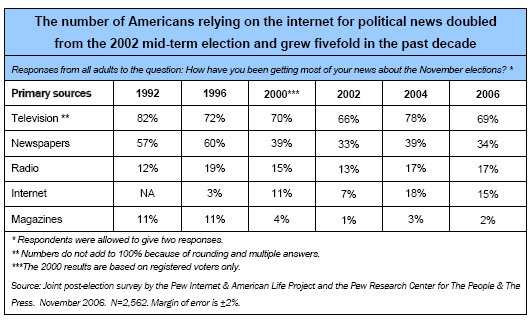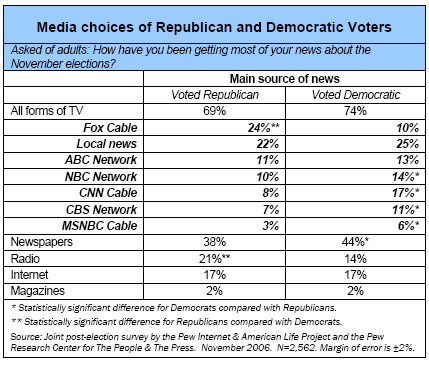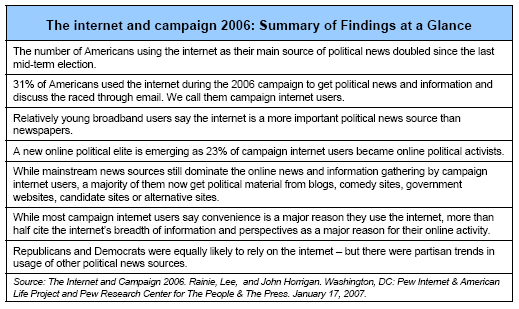The number of Americans using the internet as their main source of political news doubled since the last mid-term election.
The number of Americans who got most of their information about the 2006 campaign on the internet doubled from the most recent mid-term election in 2002 and rivaled the number from the 2004 presidential election year.
In all, 15% of all American adults say the internet was the primary source for campaign news during the election, up from 7% in the mid-term election of 2002 and close to the 18% of Americans who said they relied on the internet during the presidential campaign cycle in 2004.

31% of Americans used the internet during the 2006 campaign to get political news and information and discuss the races through email.
Some 25% of all Americans (or 37% of internet users) say they got information online about the 2006 elections and 10% of Americans (15% of internet users) say they exchanged emails about the candidates. Many people used the internet both ways – for news and for communication about politics. Altogether, 31% of all Americans (or 46% of internet users) say they were online during the campaign season gathering information and exchanging views via email. Throughout this report, we call this group campaign internet users. They represent more than 60 million people.
The growing importance of the internet in political life is tied at least in part to the spread of broadband connections in American homes. From November 2002 to November 2006, the share of adult Americans with high-speed connections at home grew from 17% to 45%. These “always on” internet connections draw people to online news of any kind, political news included.
Relatively young broadband users say the internet is a more important political news source than newspapers.
While television and newspapers still dominate political communication for the majority of Americans, there is now a group of citizens who use the internet more than newspapers. They are relatively young – under 36 years old – and they have broadband connections at home. Some 35% of those in that cohort say the internet was their main source of political news during the 2006 campaign, compared with 18% who cite newspapers. For older broadband users, the internet still seems to be a supplemental source of political information and activity.
A new online political elite is emerging as 23% of campaign internet users became online political activists.
For the first time in our politics and the internet surveys we asked respondents whether they had created and shared political content and found:
- 8% of campaign internet users posted their own political commentary to a newsgroup, website or blog.
- 13% of them forwarded or posted someone else’s political commentary.
- 1% of them created political audio or video recordings.
- 8% of them forwarded or posted someone else’s political audio or video recordings.
In all, 23% of campaign internet users (or 11% of internet users and 7% of the entire U.S. population) had done at least one of those things. That translates into about 14 million people who were using the “read-write Web” to contribute to political discussion and activity.
These internet users are particularly active in every type of online political endeavor and are the most likely group to be accessing all kinds of political material and performing most online political activities more than others. Throughout this report we call this group online political activists.
While mainstream news sources still dominate the online news and information gathering by campaign internet users, a majority of them now get political material from blogs, comedy sites, government websites, candidate sites, or alternative news sites.
Asked where they went online to get news and information about the campaign, the greatest number of campaign internet users cite traditional news organizations or online services that syndicate news from traditional sources, such as wire services. However, more than half of campaign internet users (53%) go to Web sources beyond those that are fed by traditional news media in the United States. The breakdown of where campaign internet users went:
- 60% got news and information about the campaign from news portals such as Google News or Yahoo! News
- 60% got news and information about the campaign from TV network websites such as CNN.com or ABCNews.com.
- 48% got news and information about the campaign from local news organization websites.
- 31% got news and information about the campaign from websites of major national newspapers such as USA Today or the New York Times.
- 28% got news and information about the campaign from the websites of state or local governments.
- 24% got news and information about the campaign from issue-oriented websites.
- 20% got news and information about the campaign from blogs.
- 20% got news and information about the campaign from international news organization websites, such as the BBC or Al Jazeera.
- 20% got news and information about the campaign from websites created by candidates.
- 19% got news and information about the campaign from news satire websites like The Onion or The Daily Show.
- 19% got news and information about the campaign from the websites of radio news organizations, such as National Public Radio.
- 10% got news and information about the campaign from websites of alternative news organizations, such as Alternet.org or NewsMax.com.
- 10% got news and information about the campaign from email listservs.
While most campaign internet users say convenience is a major reason they use the internet, more than half cite the internet’s breadth of information and perspectives as a major reason for their online activity.
For most, the internet’s value lies in its convenience. But many also cite its virtues as a source of information beyond that which is available in other media.
- 71% of campaign internet users cited convenience as a major reason they get political news online.
- 49% said a major reason they got political news online is that they could get information on the Web that is not available elsewhere as a major reason.
- 41%said a major reason they got political news online is that they don’t get all the news and information they want from traditional news sources such as the daily newspaper or network TV news.
- 34% said a major reason they got political news online is that they can get perspectives from outside their community on candidates and issues
- 28% said a major reason the got political news online was to get local perspectives on the races.
Republicans and Democrats were equally likely to rely on the internet – but there were partisan trends in usage of other political news sources.
Republican and Democratic voters were equally likely to say that the internet was their main source of election news (17% among each group). Seen a somewhat different way, the internet news audience for the 2006 race was no different in its vote preferences than the public as a whole.
In contrast, there were notable differences between Republican and Democratic voters in their preferences for other news sources. For instance, Democratic voters were more likely than Republicans to cite newspapers and certain broadcast and cable news operations such as CBS, ABC and CNN as their main sources of news, while Republicans were more likely to favor the Fox cable TV News and radio.

